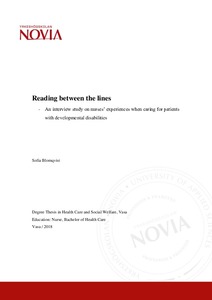Reading between the lines : an interview study on nurses' experiences when caring for patients with developmental disabilities
Blomqvist, Sofia (2018)
Blomqvist, Sofia
Yrkeshögskolan Novia
2018
All rights reserved
Julkaisun pysyvä osoite on
https://urn.fi/URN:NBN:fi:amk-2018112718399
https://urn.fi/URN:NBN:fi:amk-2018112718399
Tiivistelmä
The aim of this study is to identify and describe the challenges nurses experience when caring for patients with developmental disabilities and how these challenges affect the quality of care. The study focuses on nurses’ experiences on challenges when caring for patients with developmental disabilities as well as the strategies nurses use to overcome challenges and ensure high quality care to their patients. The background of the study describes previously identified challenges and how they can be coped with. The concepts of “caring” and “uncaring” based on Halldórsdóttir (1996) were used as theoretical framework for the study. These concepts describe how the connection between the nurse and the patient affects the patients’ experience of the care encounter as positive or negative, or as “caring” or “uncaring”.
The data collection method used in the study was theme interviews. A total of five interviews were used in the study. The interviews were transcribed and analysed using content analysis. Four main themes were identified; nurses’ attitudes, challenges in establishing rapport, overcoming challenges and ensuring quality of care. It was found that nurses generally have a positive attitude toward caring for patients with developmental disabilities, that there are challenges in establishing rapport including challenges in communication, understanding, connection and own knowledge. To overcome challenges nurses use various strategies including help from others, most often the patient’s caregivers, and by using pictures to aid in communication and understanding. Participants shared some advice on how they ensure quality of care when caring for patients with developmental disabilities, including thinking mentalities and practical arrangements. Additionally, nurses’ opinions on what is necessary in order to better be able to meet and care for patients with developmental disabilities was discussed.
The data collection method used in the study was theme interviews. A total of five interviews were used in the study. The interviews were transcribed and analysed using content analysis. Four main themes were identified; nurses’ attitudes, challenges in establishing rapport, overcoming challenges and ensuring quality of care. It was found that nurses generally have a positive attitude toward caring for patients with developmental disabilities, that there are challenges in establishing rapport including challenges in communication, understanding, connection and own knowledge. To overcome challenges nurses use various strategies including help from others, most often the patient’s caregivers, and by using pictures to aid in communication and understanding. Participants shared some advice on how they ensure quality of care when caring for patients with developmental disabilities, including thinking mentalities and practical arrangements. Additionally, nurses’ opinions on what is necessary in order to better be able to meet and care for patients with developmental disabilities was discussed.
